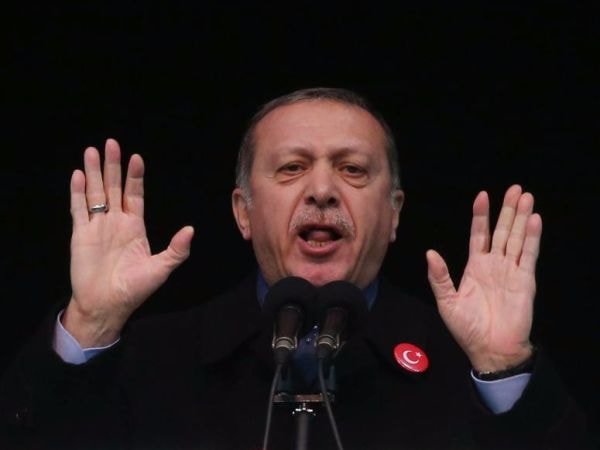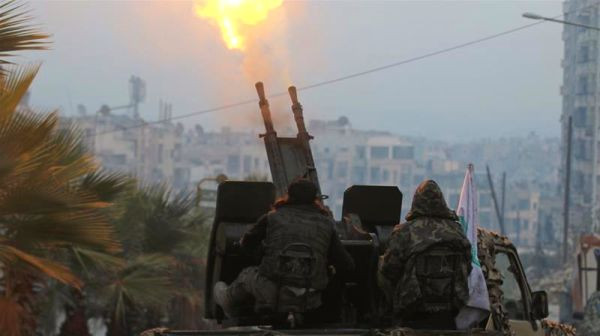Türkiye and the 'punch in the back' of America
(Baonghean) - Turkish President Tayyip Erdogan recently affirmed that there is evidence that the US-led coalition supports terrorist groups including the self-proclaimed Islamic State (IS) and Kurdish rebel groups. For the US, this 'shocking' statement is no different from a 'punch in the back' from a close ally.
Does the US support terrorism?
President Erdogan asserted “absolutely” that Türkiye has “full evidence through photos and videos” showing that the US-led coalition is secretly supporting terrorist groups such as IS, the Kurdish People’s Protection Units (YPG) and the Kurdish Democratic Union (PYD). He also criticized the US-led coalition for not keeping its commitments in the fight against IS.
This is not the first time Türkiye has expressed dissatisfaction with the US support for the PYD and YPG armed groups participating in the fight against IS in Syria. Remember in September, when in New York to attend the United Nations General Assembly, President Erdogan accused the US of providing more weapons to Kurdish fighters in northern Syria. Ankara said that the weapons were transported on two military transport planes and delivered to terrorist forces in Syria.
 |
| Turkish President accuses US of “backing” rebel groups. Photo: AP |
Earlier this year, at a meeting with local representatives, Mr. Erdogan declared that the US had caused a bloodbath in Syria because it underestimated the threat from armed forces in the region, not just IS militants. In particular, the head of the Ankara government condemned the US's refusal to confirm that the Kurdish forces in Syria were terrorists, while at the same time supporting them militarily.
However, this is the first time Ankara has wanted to publicly reveal evidence of US support for terrorism, including IS. So what makes Türkiye so strongly criticize its long-time ally?
It can be seen that recently, while the relationship with the US has become increasingly distant, the diplomatic relationship between Türkiye and Russia has been strengthened despite the assassination of the Russian Ambassador to Türkiye. Along with statements affirming that they "will not disrupt" bilateral relations, both Ankara and Moscow have shown "unanimity" on many issues, especially the war in Syria.
It is unclear whether there is any connection, but at the same time Mr. Erdogan accused the US of supporting terrorism, Russia also made similar statements. Russian Foreign Ministry spokeswoman Maria Zakharova said, "Washington is betting on military assistance to anti-government forces (Syria) - those who are crazy to shoot down planes. Now, they are likely to be equipped with weapons, including mobile anti-aircraft missiles. And it is very possible that these weapons will soon fall into the hands of jihadists."
The accusations by Russia and Türkiye came after the US administration approved the National Defense Authorization Act, which has raised concerns among both countries that the bill's passage will pave the way for the US to provide more weapons to rebels in Syria.
Ankara's calculations
It can be said that after the latest accusations, the US-Türkiye alliance has fallen to a terrible low. Observers said that President Erdogan's "shocking" statement is a warning to the US after a period of "not so good rice, not so sweet soup" recently. The two countries used to be close allies. However, this relationship began to show cracks since the military coup in Türkiye on July 15.
Many US leaders expressed displeasure when Turkish President Recep Tayyip Erdogan accused the US of supporting or “backing” the coup. Turkish officials also complained that the US was slow to support Türkiye when it needed it most. Tensions between the two countries were further heightened after the US refused to extradite Fethullah Gulen, a Muslim cleric living in exile in the US, who is also believed to be the mastermind of the failed coup on July 15 in Turkey.
 |
| Russia and Türkiye are concerned that the US is providing more weapons to rebels in Syria. Photo: EPA |
The US-Türkiye relationship has become even more complicated as the US supports the Kurds, a group that Türkiye has designated as “terrorists”. For its part, the US decided to withdraw its nuclear weapons from Türkiye and move them to Romania as a response to the accusations of the Erdogan government.
All of this has created a deep gap between the two sides, forcing Türkiye to consider new options that are beneficial to the country, including seeking, restoring and establishing a strong cooperative relationship with Russia. Turkey's entry into the "troika" of countries participating in the Syrian peace process (along with Russia and Iran) is the clearest evidence that the US is gradually being isolated on the political chessboard here. Some experts even say that Türkiye will no longer be interested in NATO.
Obviously, when tensions with the US are increasingly falling into a stalemate, Türkiye's accusations of Washington supporting terrorist rebels at this time can be seen as a strategic calculation. In addition to "threatening" the US, the Ankara government can also easily get closer to Russia and some Middle Eastern countries. Then, in the process of political dialogue on the future of Syria, perhaps the US will have to face more difficulties when dealing with opponents, including close ally Türkiye.
Thanh Huyen
| RELATED NEWS |
|---|

